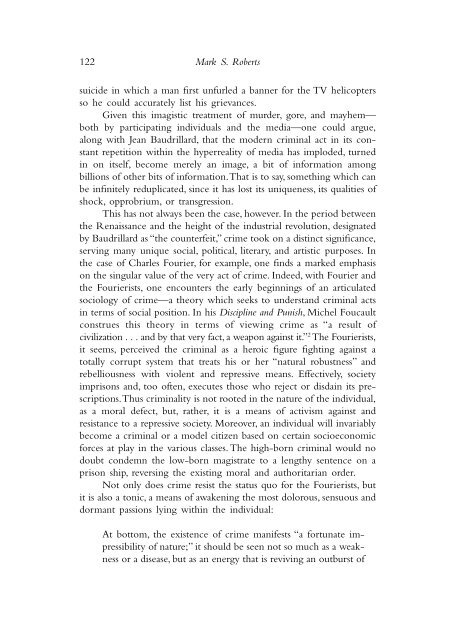Create successful ePaper yourself
Turn your PDF publications into a flip-book with our unique Google optimized e-Paper software.
122 Mark S. Roberts<br />
suicide in which a man first unfurled a banner for <strong>the</strong> TV helicopters<br />
so he could accurately list his grievances.<br />
Given this imagistic treatment <strong>of</strong> murder, gore, and mayhem—<br />
both by participating individuals and <strong>the</strong> media—one could argue,<br />
along with Jean Baudrillard, that <strong>the</strong> modern criminal act in its constant<br />
repetition within <strong>the</strong> hyperreality <strong>of</strong> media has imploded, turned<br />
in on itself, become merely an image, a bit <strong>of</strong> information among<br />
billions <strong>of</strong> o<strong>the</strong>r bits <strong>of</strong> information. That is to say, something which can<br />
be infinitely reduplicated, since it has lost its uniqueness, its qualities <strong>of</strong><br />
shock, opprobrium, or transgression.<br />
This has not always been <strong>the</strong> case, however. In <strong>the</strong> period between<br />
<strong>the</strong> Renaissance and <strong>the</strong> height <strong>of</strong> <strong>the</strong> industrial revolution, designated<br />
by Baudrillard as “<strong>the</strong> counterfeit,” crime took on a distinct significance,<br />
serving many unique social, political, literary, and artistic purposes. In<br />
<strong>the</strong> case <strong>of</strong> Charles Fourier, for example, one finds a marked emphasis<br />
on <strong>the</strong> singular value <strong>of</strong> <strong>the</strong> very act <strong>of</strong> crime. Indeed, with Fourier and<br />
<strong>the</strong> Fourierists, one encounters <strong>the</strong> early beginnings <strong>of</strong> an articulated<br />
sociology <strong>of</strong> crime—a <strong>the</strong>ory which seeks to understand criminal acts<br />
in terms <strong>of</strong> social position. In his Discipline and Punish, Michel Foucault<br />
construes this <strong>the</strong>ory in terms <strong>of</strong> viewing crime as “a result <strong>of</strong><br />
civilization . . . and by that very fact, a weapon against it.” 2 The Fourierists,<br />
it seems, perceived <strong>the</strong> criminal as a heroic figure fighting against a<br />
totally corrupt system that treats his or her “natural robustness” and<br />
rebelliousness with violent and repressive means. Effectively, society<br />
imprisons and, too <strong>of</strong>ten, executes those who reject or disdain its prescriptions.<br />
Thus criminality is not rooted in <strong>the</strong> nature <strong>of</strong> <strong>the</strong> individual,<br />
as a moral defect, but, ra<strong>the</strong>r, it is a means <strong>of</strong> activism against and<br />
resistance to a repressive society. Moreover, an individual will invariably<br />
become a criminal or a model citizen based on certain socioeconomic<br />
forces at play in <strong>the</strong> various classes. The high-born criminal would no<br />
doubt condemn <strong>the</strong> low-born magistrate to a lengthy sentence on a<br />
prison ship, reversing <strong>the</strong> existing moral and authoritarian order.<br />
Not only does crime resist <strong>the</strong> status quo for <strong>the</strong> Fourierists, but<br />
it is also a tonic, a means <strong>of</strong> awakening <strong>the</strong> most dolorous, sensuous and<br />
dormant passions lying within <strong>the</strong> individual:<br />
At bottom, <strong>the</strong> existence <strong>of</strong> crime manifests “a fortunate impressibility<br />
<strong>of</strong> nature;” it should be seen not so much as a weakness<br />
or a disease, but as an energy that is reviving an outburst <strong>of</strong>
















